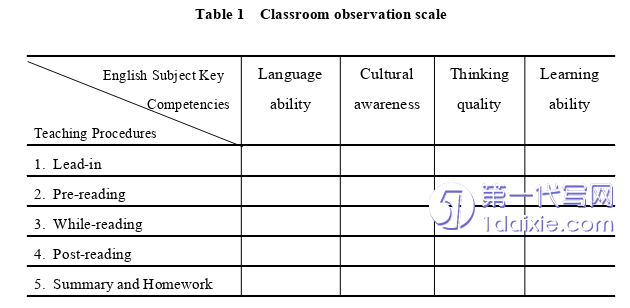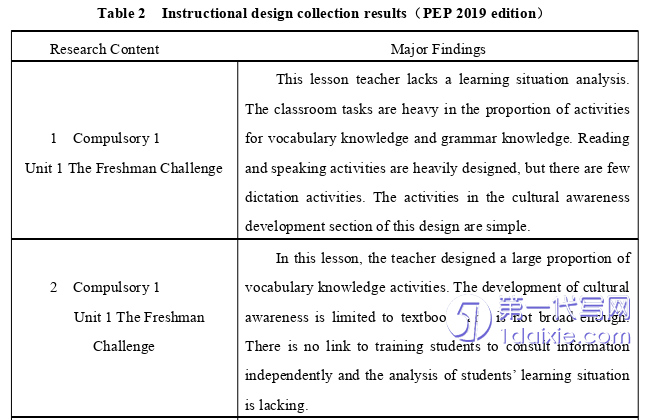本文是一篇英语论文,本研究可以为英语教师在设计基于英语学科核心素养的英语阅读课时提供一些启示,还可以帮助英语教师在英语阅读教学实践过程中系统地培养学生的学科核心素养,从而实现英语学科的育人价值。
Chapter One Literature Review
1.1 Key competencies

The rise of key competencies has had a great positive impact on the field ofeducation in China.The study of key competencies is a constant topic both at homeand abroad,and with the development of society,the study of key competencies isconstantly being updated and improved.
1.1.1 Definition of key competencies
The concept of key competencies was initially proposed by the OECD(Organization for Economic Cooperation and Development).The concept of keycompetencies is based on the background of informatization and economization in the21st century.Therefore,it can also be called 21st-century skills.The academiccommunity has not yet reached a consensus on the time of the emergence of keycompetencies,but the research on key competencies has been of great interest to allcountries since the 21st century.By integrating the perspectives of many experts,theDeS eCo project defines key competencies as the ability to meet the needs of highcomplexity with cognitive,motivational,ethical,social,and behavioral componentsthat reflect transversal,higher-order of mental complexity,and multiple dimensions(OECD,2001).The OECD(2005)defines key competence as follows.Competency ismore than just knowledge and skills.It involves the ability to meet complex demands,by drawing on and mobilizing psychosocial resources(including skills and attitudes)in a particular context.
On March 30,2014,the Ministry of Education promulgated the Opinions onComprehensively Deepening Curriculum Reform and Implementing the FundamentalTask of Establishing Virtues for People,in which the term key competencies appearedfor the first time.On September 13,2016,the overall framework of Key Competencies for Student Development in China was officially released,whichdivided key competencies into three areas,including cultural foundation,independentdevelopment and social participation.In China,some scholars believed that keycompetencies originated in the 1970s and mainly referred to the need for people toquickly master competencies that could be used throughout their lives to adapt torapid developments such as technology and culture(Shao&Zhou and Cui,2015).Zhang Hua(2016)believed that key competencies were the high-level ability andhuman capacity of people to adapt to the needs of the information era and knowledgesociety,solve complex problems and adapt to unpredictable situations.
1.2 Key competencies of English subject
As an important branch of key competencies,English subject key competenciesplay a pivotal role in students’overall development.
1.2.1 Definition of key competencies of English subject
The key competencies of English subject are refinement of the subject keycompetencies.The English Curriculum Standards for General Senior High Schoolpromulgated in 2017 proposed that the key competencies of the English subject werethe core basis for the development of the new English curriculum standards,and arethe concrete expression of the key competencies in the English subject.It is a specificexpression of the requirements of the English subject for the cultivation of students’abilities(Ministry of Education,2018).At the senior high school level,Zhang Hanyue(2017)pointed out that the key competencies in English include the following areas.The language cognitive part includes the degree of the basic language standard,thedegree of vocabulary cognition and the degree of grammar knowledge reserve.In thearea of language skills,students are required to be able to listen,speak,read and write.In the area of language thinking,students are required to have a basic sense oflanguage,to be able to use the language according to the context and to establishlanguage thinking.
Chapter Two Theoretical Basis and Methodology
2.1 Theoretical basis
This chapter introduces the theoretical basis of this study,which areconstructivist learning theory and humanistic education theory.
2.1.1 Constructivist Learning Theory
Constructivism is also known as structuralism.For the origin of constructivism,R.Nola,a New Zealand scholar,points out that Socrates and Plato are the firstconstructivists in education.Constructivist learning theory was developed by Piaget,the greatest developmental psychologist of the 20th century.Jean Piaget is only seenas the most recent proponent of contemporary constructivist theory because he createsa theory about the cognitive development of children.The introduction ofconstructivism to China in the 1960s and 1970s has had a significant impact onEnglish language teaching in China in particular.As one of the advanced educationalguiding ideas,constructivist learning theory still has a profound influence in the 21stcentury.In his research,he pointed out that constructivist learning theory insisted onadvocating student-centeredness and emphasized that students’learning took placeunder the interaction of internal and external factors.Students constructed theircognition of the world around them and built up their knowledge structure in theprocess of interacting with their surroundings(Zhang,2021).
In terms of the constructivist view of knowledge,constructivism holds thatknowledge is not an accurate characterization of reality,nor is it the final answer to aquestion,but only an explanation and a hypothesis.Students are the subjects ofmeaning construction,and their acceptance of knowledge can only be achievedthrough their constructions.Knowledge has to be recreated for specific situations.Learning is a process for students to construct their knowledge,which can not bereplaced by others.
2.2 Methodology
In this section,the author elaborates on five parts:research questions,researchsubjects,research methods,research tools,and research procedures.
2.2.1 Research questions
Based on the development goals of the four subject key competencies set by thesenior high school English curriculum standards,this study aims to solve thefollowing three problems in the research study
(1)What is the current status of senior high school English teachers’applicationof English subject key competencies in the instructional design of reading classes?
(2)What are the factors that influence the implementation of subject keycompetencies in the instructional design of senior high school English readingclasses?
(3)How do teachers effectively practice the concept of key competencies in theinstructional design of senior high school English reading classes?
Chapter Three Results and Discussion.................................35
3.1 Data analysis......................................35
3.1.1 Analysis of the instructional design.................................35
3.1.2 Analysis of the classroom observation...........................42
Conclusion...............................65
Chapter Three Results and Discussion
3.1 Data analysis
The following is an analysis of the results of instructional design cases,classroom observations and interviews.
3.1.1 Analysis of the instructional design
The results of the analysis of the instructional design cases collected from 10senior high school English teachers according to the criteria and conditions of theEnglish subject key competencies are shown in the following Table 2.

Conclusion
Main findings
Taking humanistic education theory and constructivist learning theory as thetheoretical basis of the study,based on the analysis of the instructional design ofEnglish reading class based on English subject key competencies and combined withclassroom observation and interview results,the author summarizes the followingcurrent situation of the application of English subject key competencies in senior highschool English reading class teaching,and the factors affecting its implementation inteaching.
This study addresses the following three questions.(1)What is the current statusof senior high school English teachers’application of English subject keycompetencies in the instructional design of reading classes?(2)What are the factorsthat influence the implementation of subject key competencies in the instructionaldesign of senior high school English reading classes?(3)How do teachers effectivelypractice the concept of key competencies in the instructional design of senior highschool English reading classes?The following conclusions are drawn from theanalysis of the data obtained from the instructional design cases,classroomobservations,and interviews.The application of subject key competencies in Englishreading class instructional design by senior high school English teachers is not ideal,but at this stage,senior high school English teachers in the Tongliao area have someawareness of English subject key competencies and are consciously integrating it intotheir instructional design.Schools and younger teachers put more emphasis on thecultivation of subject key competencies.However,teachers are still designingclassroom activities that lack certain key competencies or develop language skillsmore often.Four reasons affect the implementation of subject key competencies ininstructional design,one of which is because of today’s examination-orientededucation system.The other is because of teachers’teaching concepts.The third oneis because of the teachers’inappropriate time adjustment and control of teachingactivities,and the fourth one is because of the lack of learning situation analysis.
reference(omitted)
